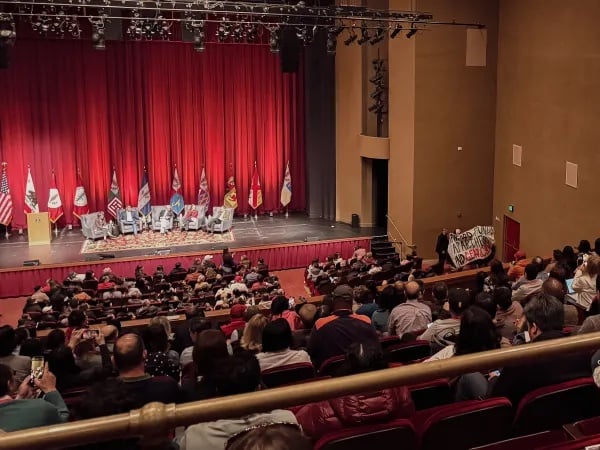Protest and activism at Stanford are deeply linked. Both have a long and powerful history that can be revisited by perusing Stanford Libraries’ “Activism” online site. Having witnessed both protests and activism in the late 1980s and early 1990s, it was vital to see crucial issues of our time — apartheid, racial discrimination, the Western Civilization curriculum, diversity in faculty representation — actively debated and acted upon by Stanford students, faculty and administrative officers.
Some protests were civil, others not, but President Kennedy and faculty eventually engaged with concerned and affected students. Conversations happened, regardless of how ugly it looked or difficult it got.
Yet now, given recent protests at Stanford’s Parents Weekend (reported, I would add, accurately in the pages of The Stanford Daily), the University is straying from the legacy of activism today’s students are embracing. The winds of freedom, it seems, still blow, albeit maybe only in one direction.
As an alum and parent of a Stanford student visiting almost three weeks ago, we expected to see growing dissatisfaction over the University’s position on Israel. Its investment choices, its stance on Israel’s war with Hamas and the plight of the tens of thousands of innocents dying unnecessarily in the conflict were common discussions with my student in the previous weeks.
We knew about the sit-in in White Plaza. We expected student protests all weekend. We hoped that President Saller and his peers would critically address the concerns of students both for and against the protests.
What I saw on parent’s weekend was both impressive and unexpected. Impressive, because of the ingenuity, persistence and non-violent actions of the students that made their points about their deep distress at Stanford’s possible ties to Israel’s current administration.
Unexpected, because of the reactions of many parents in attendance. These parents felt the right response to these protests was to shout down the demonstrators. Yells of “boos,” “shut up,” “go away,” “we don’t care” and applause by those same parents accompanied the students’ departure. Those reactions were simply sad, uncalled for and not the sentiment I expected from anyone associated with Stanford. Why belittle students earnest in their intentions and efforts, students who want to believe their chosen university could be something more?
It is easy to understand how those parents might come to those views and actions. For some, it was their first time on campus and their first time visiting their child in a place that, rightly, has changed them. Some clearly traveled great distances for the event. Still others expected an idyllic weekend to match the sunny weather and warm welcome. Maybe they did not agree with the reason for and target of the protests. Perhaps they did not like how the students’ points were being made, or maybe they just felt like this event was “their time” and should be free of disruption.
On a university campus, one known globally for its wide-ranging academic pursuits and creative expressions, some of my fellow parents chose to verbally abuse someone else’s children. All because those young adults were practicing one of the fundamental rights this country affords, essential to any credible institution of higher learning. It is a moment of powerful imbalance I cannot ever recall seeing in an academic setting.
With the words from the on-stage panel about fostering a civil and respectful discourse still ringing in the room, adults chose not to be the more mature, considered and compassionate example. Instead, in word and action, students were shown their concerns were worthless, that their beliefs do not matter.
And — perhaps more shockingly — President Saller, Provost Martinez and several deans sat on stage and watched. When presented with a chance to engage in a very real and honest way, they leaned back.
When there could have been a moment to show both rude parents and anxious students how to de-escalate and connect, they chose to look at their notes. By the administration’s performance that afternoon, it is not hard to believe students who say the past four months have been ones in which the University would not substantially engage, meaningfully speak or actively listen. No wonder students took to MemAud to make a stand.
It is not hard to grasp why the President and the Provost took little action. Since October, college campuses have been deeply and controversially embroiled in protests focused on every side of this conflict.
Ill-timed or poorly handled reactions by college leaders have cost at least two university presidents — one a Stanford alum — their positions by factions that would polarize and weaponize the ripples of this conflict to their own ends.
It is all too easy to believe Stanford’s leaders are exhausted by the tightrope that they must walk. But it is also a moment that desperately calls for engagement, discourse and intelligence in the face of disruption and disagreement.
To the student groups protesting the Israel-Gaza conflict, seeking to be heard and seeking real change from the University, know that the history of protest at Stanford does bend toward justice.
You are doing what we should expect from brilliant, enthusiastic young minds on a college campus: making your voices heard, working to make our world better. You are seen and you are heard.
You continue a tradition I hope all students, faculty, administrators and — hopefully, someday — parents can come to respect. Perhaps not enjoy, but certainly understand its necessity.
To you, and on behalf of the parents and friends of the University that understand this moment, I would tell you this: Keep going.
John Bartol ’92 is a Stanford parent.
